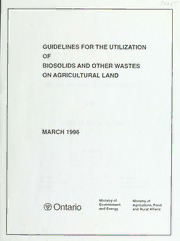
Guidelines for the utilization of biosolids and other wastes on agricultural land PDF
Preview Guidelines for the utilization of biosolids and other wastes on agricultural land
S/D-sr GUIDELINES FOR THE UTILIZATION OF BIOSOLIDS AND OTHER WASTES ON AGRICULTURAL LAND MARCH 1996 Ministryof Ministryof ®r\r^j'C\Y'\r\ Environment Agriculture, Food V-/I IIcll lU and Energy and RuralAffairs GUIDELINES FOR THE UTILIZATION OF BIOSOLIDS AND OTHER WASTES ON AGRICULTURAL LAND March 1996 Ministry of Ministry of Environment and Agriculture, Food Energy and Rural Affairs Table of Contents INTRODUCTION Section 1. (1) PROCEDURES Section 2. (1) Section 2.1 Submissions (2) Section 2.2 Analytical Requirements (2) Section 2.3 Assessing Suitability (2) Section 2.4 Certification and Approval ofSpreading Operations (3) Section 2.5 Monitoring and Quality Control (3) Section 3. WASTE MATERIAL STABILIZATION (3) Section 3.1 Sewage Biosolids (4) Section 3.2 Other Wastes (4) Section 4. CRITERIA RELATING TO WASTE ELEMENTS (4) Section 4.1 Potentially Desirable Constituents (5) Section 4.11 Nitrogen (5) Section 4.12 Phosphorus (5) Section 4.13 Potassium (6) Section 4.14 Other Nutrients (6) Section 4.15 Organic Matter (6) Section 4.2 Potentially Undesirable Elements (6) Section 4.21 Metals ofPrincipal Concern to Agriculture (6) Section 4.22 Sodium (7) Section 4.23 pH (7) Section 4.24 Boron (7) Section 4.25 Other Elements (8) Section 4.26 Industrial Organic Contaminants (8) Section 5. CRITERIA & SPREADING RATES (8) Section 5.1 Sewage Biosolids (8) Section 5.11 Anaerobically Digested Sewage Biosolids (9) Section 5.12 Aerobically Digested and Other Stabilized Aerobic Sewage Biosolids (9) Section 5.13 Dewatered and Dried Sewage Biosolids (9) Section 5.14 Marginally Acceptable Sewage Biosolids (10) Section 5.2 Wastes Other Than Sewage Biosolids (10) (i) Section 6. CRITERIA RELATING TO SPREADING SITES (10) Section 6.1 Separation Distances [10) Section 6.11 Separation From Surface Watercourses [11) Section 6.12 Separation From Groundwater [11) Section 6.13 Separation From Bedrock ;i2) Section 6.14 Separation From Residences :12) Section 6.15 Separation From Water Wells [12) Section 6.2 Soil Criteria .... [12) Section 6.21 Organic Soils [12) Section 6.22 Metals [13) Section 6.23 Phosphorus [13) Section 6.24 Soil pH :13) Section 6.25 Soil Tests ;i3) Section 6.3 Snow Covered and Frozen Ground [13) Section 6.4 Slopes [13) Section 6.5 Reducing Runoffand Soil Compaction :14) Section 6.6 Suitable Crops and Waiting Periods After Spreading ;14) Section 7. WASTE MATERIAL HANDLING AND SPREADING ;i4) Section 7.1 Requirements for Storage :i4) Section 7.2 Sewage Biosolids Blending ;i5) Section 7.3 Waste Materials Spreading :i5) Section 8. RESPONSIBILITIES AND RIGHTS ;i5) Section 8.1 Operating Agencies :15) Section 8.11 Record-keeping :15) Section 8.12 Waste Material Analysis .... :i6) Section 8.13 Monitoring Application Rates [16) Section 8.14 Contingency Planning [16) Section 8.15 Marginal Sewage Biosolids . . ;i6) Section 8.2 Waste Material Haulers and Spreaders :i7) Section 8.3 Farmers :i7) Section 9. COMPLAINTS REGARDING SPREADING METHODS AND INTERPRETATION OF GUIDELINES (18) (ii) List of Tables TABLE 1: Criteria for Metal Content in Sewage Biosolids (19) TABLE 2: Criteria for Metal Content in Soils (20) TABLE 3: Sodium Criteria (21) TABLE 4: Separation Distances (21) TABLE 5: Minimum Separation Distances ofSpreading Sites from Watercourses . . . (22) TABLE 6: Waste Material Application for Specific Crops (23) TABLE 7: Spreading Restrictions Related to Public Health and Pathogens (24) (iii) List of Figures FIGURE: 1 Information Flow (25) FIGURE 2 Report on Waste Materials Applied to Agricultural Land (26) FIGURE 3 Sample Calculation (27) FIGURE 4 Calculations for Aerobic Biosolids Use on Land (28) FIGURE 5 Calculations for Anaerobic Biosolids Use on Land (28) (iv)
